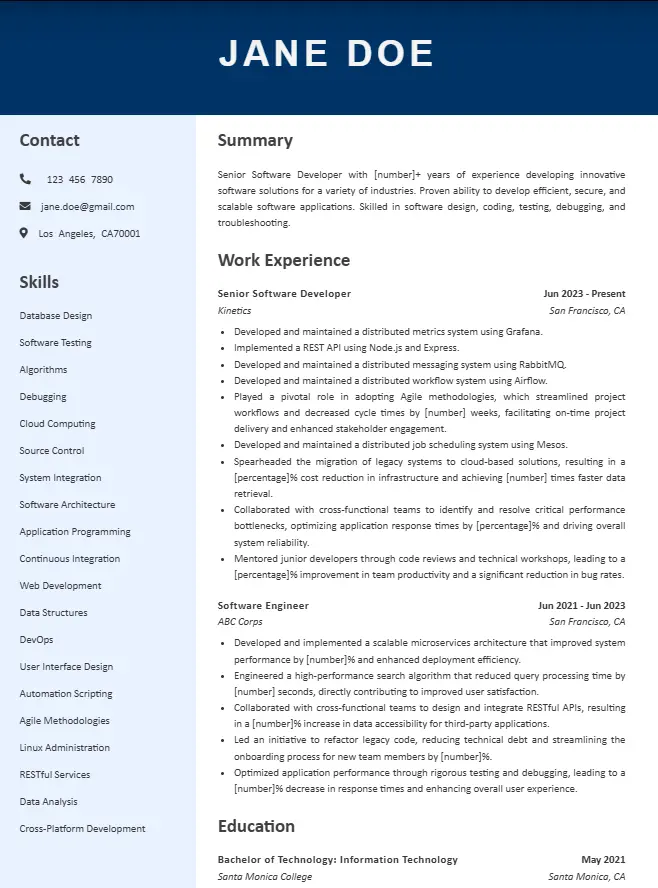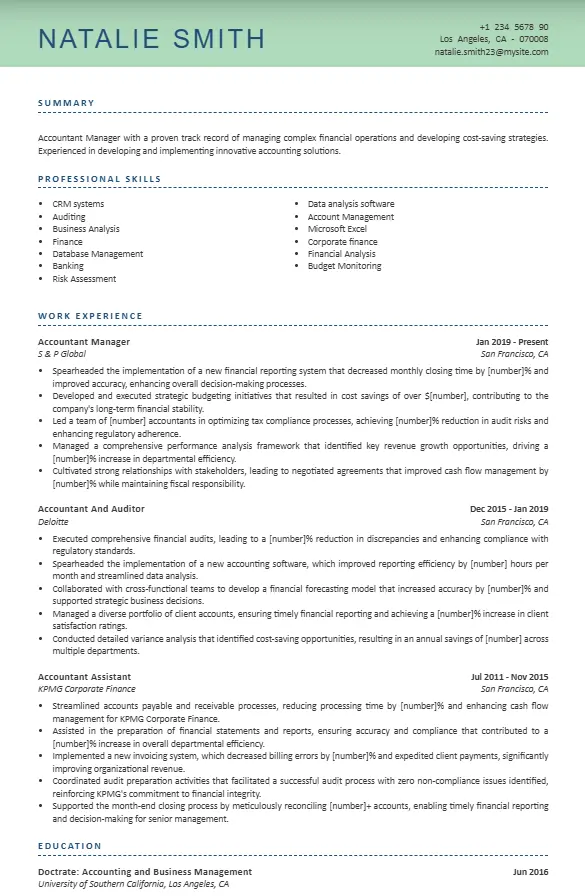Want to land your dream job? You should learn what skills to put on a resume to successfully compete in the job market. Your work experience and education are certainly important parts of your resume. However, recruiters nowadays also expect employees to have certain skills on their resume.
So, if you are not sure which skills you need to highlight in your resume and how to present them effectively, you are in the right place!
In this comprehensive guide, we will thoroughly discuss the good skills you need to put on your resume to land your dream position.
Understanding the Two Types of Resume Skills
Let’s start by understanding the two major types of skills on a resume.
1. Hard Skills (Technical Skills)
Hard skills are specific, teachable abilities that can be defined and measured. These are typically learned through education, training, or on-the-job experience.
Examples of hard skills:
- Programming languages (Python, Java, C++, JavaScript)
- Software proficiency (Microsoft Office, Adobe Suite, Salesforce)
- Data analysis (SQL, R, SPSS)
- Foreign language proficiency
- Accounting and financial analysis
- Project management methodologies (PMP, Agile, Scrum)
- Technical writing
- Machine operation
- Database management
Read More : – Hard Skills For Resume
2. Soft Skills (Interpersonal Skills)
Soft skills are personal attributes that help you interact with others effectively. Soft skills are generally difficult to quantify but they are becoming more valued by employers across various sectors.
Examples of soft skills:
- Communication (written and verbal)
- Leadership
- Teamwork and collaboration
- Problem-solving
- Adaptability and flexibility
- Time management
- Critical thinking
- Emotional intelligence
- Conflict resolution
- Customer service
Read More :- Top Soft Skills For Resume
How to Determine Which Skills to Include on the Resume?
Unlike the popular belief, you don’t have to include every single thing about yourself on the resume. In other words, not all skills are important enough to be included on your resume.
You can determine which skills are important to be included on the resume by following these steps:
1. Analyze the Job Description
The job description is your best resource to identify relevant skills. Employers explicitly state what they’re looking for, so pay close attention to the language they use.
Example: If a marketing position lists “experience with SEO and content writing” as requirement, make sure to highlight your SEO expertise and content writing skills.
2. Research the Industry and Company
Different skill sets are important in different industries and companies. So, you should research the industry trends and the specific organization culture to determine what skills are most relevant.
Example: A startup may give more importance to adaptability, initiative, and the ability to wear multiple hats. On the other hand, a large enterprise might prioritize specialized expertise and process management.
3. Analyze Your Strengths
Self-awareness is an important part of the resume writing process. You should identify what you’re genuinely good at. Authentic skills that you can demonstrate will always serve you better than making exaggerated claims on your resume.
Example: If you’ve consistently received praise for your research skills, make sure these are highlighted. Add specific instances where you applied the mentioned skills successfully.
Top Skills to Include by Industry
Different industries prioritize different skill sets. Here’s a breakdown of valuable skills by sector:
Technology
- Hard skills: Coding languages (Python, JavaScript, Ruby), cloud computing (AWS, Azure), cybersecurity, machine learning, mobile development, UI/UX design
- Soft skills: Problem-solving, adaptability, collaboration, continuous learning
For example, you can highlight these skills by adding this bullet point to your resume:
- “Designed and developed responsive web applications using React.js and Node.js, improving client site performance by 50% and reducing bounce rates by 20%.”
Read More :- Technical Skills For Resume
Healthcare
- Hard skills: Electronic Medical Records (EMR) systems, patient care, medical terminology, regulatory compliance, diagnostic procedures
- Soft skills: Empathy, attention to detail, stress management, clear communication
Example: “Organized accurate patient records using EMR system while managing care for 30+ patients daily, ensuring 100% compliance with HIPAA regulations.”
Finance
- Hard skills: Financial modeling, data analysis, risk assessment, regulatory knowledge, Bloomberg Terminal, Excel
- Soft skills: Analytical thinking, attention to detail, ethical judgment, presentation skills
Example: “Created complex financial models using Excel and Python that identified $1.3M in potential cost savings, presenting findings to C-suite executives.”

Marketing
- Hard skills: Social media management, SEO/SEM, content creation, Google Analytics, CRM software, graphic design
- Soft skills: Creativity, strategic thinking, communication, trend awareness
Example : “Managed company social media presence across 3 major platforms, increasing engagement by 58% and driving 45% more website traffic through strategic content campaigns.”
Read More :- Marketing Resume
Education
- Hard skills: Curriculum development, assessment methods, educational technology, subject matter expertise
- Soft skills: Patience, adaptability, communication, cultural sensitivity
Example point: “Developed innovative science curriculum incorporating digital learning tools that improved student assessment scores by 22% year-over-year.”

Trending Skills in High Demand Across Industries
Some skills are universally valued regardless of industry. Here are some high-demand skills worth highlighting:
Data Analysis
The evolution of big data has made data analysis an important skill to have for most jobs. It refers to the ability to analyze and interpret information, which is valuable everywhere.
Example: “Analyzed customer purchasing patterns using SQL and Tableau, identifying three key segments that informed a targeted marketing campaign, resulting in a 35% increase in conversion rates.”
Digital Literacy
The role of IT systems in every other job means employers often look for employes who are proficient with digital tools and platforms. So, if you are applying for a job that involves technical process, you need to demonstrate your technical and digital literacy.
Example: “Streamlined team workflow by implementing digital collaboration tools (Slack, Asana, Google Workspace), reducing project completion time by 30%.”
Remote Work Proficiency
The ability to work effectively in remote or hybrid environments has become crucial.
Example: “Managed remote team of 12 across 3 time zones, maintaining productivity levels and meeting all project deadlines through strategic communication and digital collaboration.”
Emotional Intelligence
Understanding and managing emotions—both your own and others’—is increasingly recognized as a critical workplace skill.
Example: “Resolved customer complaints with a 98% satisfaction rate by employing active listening and empathetic problem-solving approaches.”
How to Effectively Present Skills on Your Resume?
Once you have identified the good skills you need to put on your resume, the next step is to effectively present them.
1. Create a Dedicated Skills Section
Include a clearly labeled skills section, typically after your resume summary or objective statement.
2. Weave Skills Into Your Work Experience
Instead of creating separate bullet points to demonstrate your skills, you can also include them along with your work experience.
Example: Instead of simply stating “project management skills,” write: “Led cross-functional team of 8 members to deliver $1.2M product launch on time and 5% under budget using Agile methodology.”
3. Quantify When Possible
Remember that quantifying your skills and work experience can greatly help you impress the employer and make a memorable impression.
Example: Instead of “Improved customer service,” write: “Improved customer satisfaction scores by 27% through implementation of new CRM system and team training.”
4. Tailor for ATS (Applicant Tracking Systems)
Many companies use ATS to filter resumes before human eyes see them. Use relevant keywords from the job description to ensure your resume passes these systems.
Example: If the job requires “experience with cloud computing,” don’t just list “AWS”—explicitly include “cloud computing” as well.
Common Mistakes to Avoid
When listing skills on your resume, watch out for these pitfalls:
1. Listing Too Many Skills
Focus on quality over quantity. 8-12 highly relevant skills are better than 20+ loosely related ones.
Example mistake: Listing every software program you’ve ever used, including outdated ones irrelevant to the position.
2. Being Too Generic
Vague skills like “communication” or “leadership” don’t say much without context.
Example improvement: Instead of just “leadership skills,” specify “Team leadership: Managed and mentored 5 junior associates, with 3 promotions within their first year.”
3. Exaggerating Your Expertise
Honesty is crucial. If you claim to be an expert, be prepared to demonstrate that expertise.
Example approach: Use modifiers like “proficient in,” “experienced with,” or “knowledge of” to accurately reflect your skill level.
4. Neglecting Soft Skills
Technical skills may get you through the door, but soft skills often determine your success and advancement.
Example balance: For a technical role, you might list 7-8 relevant hard skills and 3-4 soft skills that complement your technical abilities.
Skills to Emphasize in your Resume in 2025
As the job market evolves, certain skills are gaining prominence:
AI Literacy
Understanding how to work with artificial intelligence tools and interpreting their outputs.
Example: “Leveraged AI-powered analytics tools to identify market trends, resulting in product adjustments that increased quarterly sales by 18%.”
Sustainability Knowledge
Awareness of environmental impacts and sustainable business practices.
Example: “Implemented paperless workflow systems reducing office supply costs by 22% while advancing company sustainability goals.”
Cross-cultural Communication
The ability to work effectively across diverse cultural contexts.
Example: “Facilitated collaboration between US and Asia-Pacific teams, bridging communication styles and time zones to deliver global product launch on schedule.”
Adaptability and Continuous Learning
The willingness and ability to acquire new skills as job requirements evolve.
Example: “Self-taught advanced data visualization techniques through online courses, applying new knowledge to create executive dashboards that improved decision-making efficiency by 35%.”
Final Tips for Resume Skill Optimization
As you finalize your resume, keep these strategies in mind:
- Update regularly: Review and refresh your skills section every few months to reflect new competencies.
- Seek feedback: Ask industry professionals to review your skills section for relevance and impact.
- Support with evidence: Be prepared to discuss and demonstrate your skills during interviews with specific examples.
- Consider skill levels: For technical skills, consider indicating your proficiency level (e.g., beginner, intermediate, advanced).
- Align with your career goals: Emphasize skills that not only match the current job but support your long-term career trajectory.
Conclusion
Your skills section is far more than a list of abilities you have—it’s a strategic tool for positioning yourself as the ideal candidate for the job you are applying.
By thoughtfully selecting, organizing, and presenting your skills, you create a compelling case for your candidacy that resonates with both automated systems and human recruiters.
Remember that the most effective resume skills are relevant, specific, demonstrable, and authentic. With this approach, you’ll maximize your chances of landing interviews and ultimately securing your target position.

